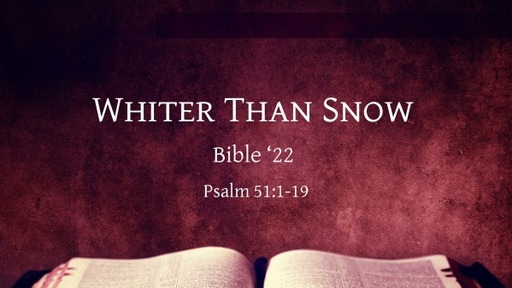Whiter Than Snow

Sermon • Submitted • Presented • 40:45
0 ratings
· 37 viewsFiles
Notes
Transcript
Handout
Sermon Tone Analysis
A
D
F
J
S
Emotion
A
C
T
Language
O
C
E
A
E
Social
Introduction
Introduction
Growing up watching soap operas:
Common tropes:
XXXXX
Background (title) - 2 Samuel 11 - 12
Text
Text
vv. 1-4
Trapeze artists with the safety net. You’re willing to do things you maybe wouldn’t find safe otherwise!
God’s grace catches you when you confess sin.
David’s confession is based upon the character of God.
Where it starts - turning to God with love and mercy that only God can provide.
And with that safety net of God’s character, David begin his confession, vv. 1b-3
The abundance of his sin that is expressed through these words.
2nd Verse of It Is Well With My Soul by Horatio Spafford
My sin—O the bliss of this glorious thought—
My sin, not in part but the whole,
Is nailed to the cross and I bear it no more:
Praise the Lord, praise the Lord, O my soul!
The whole, the abundance, of David’s sin!
Even the sin that seemed to hand as an albatross around his neck - the death of his son who had been conceived by his sinful actions. “my sin is ever before me.”
The beauty of God’s grace is that we are freed from that condemnation.
1 There is therefore now no condemnation for those who are in Christ Jesus.
And it is only God who can forgive because we have sinned against Him alone.
This may seem strange because of his assault of Bathsheba and the murder of Uriah, her husband. This is the difference between wronging someone and sinning. Sin is the breaking of God’s commands. Which we all have done. But, when we break God’s infinitely holy Law, we deserve an infinite punishment. This is because God is just and the scales of justice must be balanced.
Romans 6:23 (ESV)
23 For the wages of sin is death...
Just as David was confronted with the severity of his own sin...
We all must consider the severity of our own sin.
vv. 5-12
David realizes the fact that he didn’t just sin, but that he has a sinful nature.
We are all born corrupted.
We don’t have to teach our kids to be selfish or to lie or to cheat.
We are born with a nature, or an inclination, towards sin.
But, God’s plan for us is redemption!
Redemption leads to transformation.
Especially as we look at vv. 13-15
Praise is rooted in this transformation.
“A great sinner pardoned makes a great singer.”
-Charles Spurgeon
Worship is a fruit of salvation.
Different aspects of life - corporate and private worship.
But, what does this redemption look like?
vv. 7-12
Hyssop (v. 7). A plant that was used to sprinkle either blood or water on something else to mark it as clean. So, for David to ask to be cleansed with hyssop, it would be the application of something onto himself that would provide cleansing from sin.
Within this ritual, there was the requirement of an external means. Sometimes water, but typically it was the blood of a sacrifice that would then be sprinkled on the consecrated items around the temple or the priests.
Forgiveness requires an external force.
You cannot save yourself! But, this is why Jesus came! As the Lamb of God, whose blood was spilled so that you could receive forgiveness.
Then, we are able to experience what David asked for in v. 10.
“Has sin so destroyed us that the Creator must be called in again?”
-Charles Spurgeon
And the answer is, “Yes!”
Again, not something you can do for youself.
Two words for create in the Old Testament. The particular word for create, “bara,” is a verb that is only done by God.
Only God can give you a new life.
Then, not only does He make you new, but He will also “uphold” you.
Robert Murray M’Cheyne
(1813 - 1843)
The Scottish pastor, Robert Murray M’Cheyne explained it this way: We are all like gunpowder where all we need to explode into sinful behavior is the smallest of spark. The Spirit serves as a preventative, basically as moisture, keeping us from being volatile. It is when we disassociate from God, removing His influence or His upholding hand, that we dry out and become a danger to ourselves and to those around us.
vv. 16-19
David closes his prayer by expressing the revival that has occured in his own life.
Compare vv. 16-17 to
6 “With what shall I come before the Lord, and bow myself before God on high? Shall I come before him with burnt offerings, with calves a year old?
7 Will the Lord be pleased with thousands of rams, with ten thousands of rivers of oil? Shall I give my firstborn for my transgression, the fruit of my body for the sin of my soul?”
8 He has told you, O man, what is good; and what does the Lord require of you but to do justice, and to love kindness, and to walk humbly with your God?
God is concerned with your inner life.
And when our own lives are right, it ripples out. It will effect our families, our churches, our communities, and our nation.
vv. 18-19.
God can restore brokenness.
His desire is to bring forgiveness and healing into your life.
And He will do that for you today.
